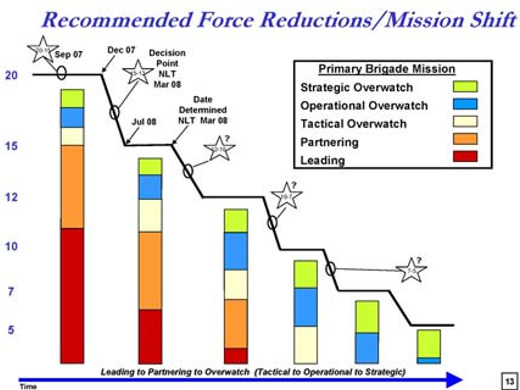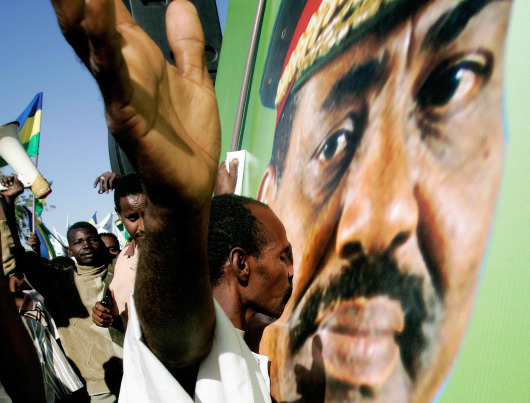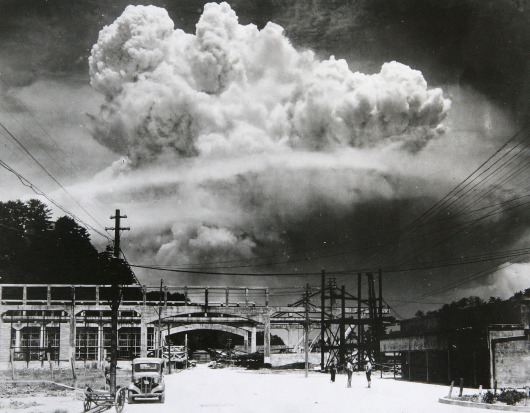Passport : Tom Ricks : Dan Drezner : Stephen Walt : David Rothkopf : Marc Lynch
The Cable : In Other Words : Shadow Govt. : The Argument : The Call
The way forward in Afghanistan

Sarah Chayes, one of the more courageous people out there, has laid out a good comprehensive plan for what we should do in Afghanistan. I have a few quibbles -- for example, I don't think the Kabul government ever enjoyed a monopoly on the use of force in the country -- but overall, this is a very impressive document, certainly more thoughtful than anything else I've seen. Funny how people always bellyache about "the interagency," and then one person living in a mud compound in Kandahar produces a cross-government plan.
(Hat tip to one a smart officer in Kandahar on this.)
MASSOUD HOSSAINI/AFP/Getty Images
The story of Iraq as the story of the American presence
Phil Bennett, one of the more astute newspaper editors I've ever met, has a good piece in this coming Sunday's Washington Post about how for Americans, the story of Iraq has become the story of the American presence. He notes that in my new book and others, Iraqis play a very minor role. As readers of ForeignPolicy.com's book discussion know, I think his observation is correct.
Advertisement
Tommy R. Franks watch

General Franks may have been even worse a wartime commander than I thought. Readers of my book Fiasco know that I think he got the war in Iraq off on the wrong foot in 2003, believing the war was over when the enemy capital fell. I've just started reading Seth Jones's book on the war in Afghanistan, In the Graveyard of Empires, which someone told me is going to be the Fiasco of that war. I was struck by this observation by Jones that the invasion of Afghanistan also was botched:
Instead of defeating al Qa'ida and the Taliban in 2001, the U.S.-led Coalition merely pushed the core leadership of al Qa'ida and the Taliban out of Afghanistan and into Pakistan. This outcome was not inevitable."
More to come.
Mark Wilson/Getty Images
Is it the Obama plan of 2009, or the Petraeus plan of 2007?

Is there any difference between the plan for U.S. troops levels in Iraq that President Obama unveiled recently and this plan that General Petraeus presented to Congress back in 2007? My guess, looking at the general's envisioned drawdown, is: A little, but not much. (Remember that the plan for a post-2010 "non-combat mission" calls for two combat brigades, re-named advisory units.)
Flickr
The defenestration of Freeman

My two bits: I think that Charles Freeman is correct in asserting that people in this country who criticize Israel get jumped on. But Freeman's ties to China and Saudi Arabia made him a lousy poster boy for the first amendment, which I think is why he found himself so alone so quickly.
I do wonder if this whole incident was a kind of warning shot across the bow of retired Admiral Dennis Blair, the new director of national intelligence. The U.S. military long has been less enamored of Israel than has the U.S. Congress. Navy intelligence types in particular have been wary of Israel since the Israeli attack on the USS Liberty in 1967, which left 34 sailors dead. Historian Michael Oren calls that controversial incident "one of the most painful chapters in the history of America's relationship with the State of Israel."
By the way, I think the New York Times probably was slow on this story not because the subject matter was sensitive but because controversy over the relatively minor post Freeman was getting didn't strike them as newsy. I think their news judgment probably has been altered, and you can bet they'll cover it the next time. The classic gambit would be to do a Sunday story that "steps back" to cover the big picture -- and, an editor might mutter, "get us back in the ballgame."
What a long strange war it's been

It struck me that the massacre of 24 Iraqis happened more than three years ago. This war is beginning to feel very long to me. But then I think it will be America's longest war, outstripping not just Vietnam but the revolution. (And before the Bruce Palmer fan club starts posting about Vietnam a 25-year war, let me say that by that measure, the Iraq war began in August 1990.)
(This post has been updated.)
Zooomaboom/Flickr
The disasters that don't happen

I was on a panel last night in Manhattan with retired Gen. Barry McCaffrey, the bane of the New York media, and Alex de Waal. McCaffrey was his usual interesting self. Darfur expert De Waal made a comment that struck me: When catastrophe is averted -- famine, civil war, genocide -- the media tends to shrug and ignore the good outcome. The implication, I think, is that successes tend to be neglected while failures are overemphasized, and bureaucrats and diplomats wind up looking more incompetent than they are. I think he is right. As of this morning I don't have any good ideas about how the media might do better in this area, but I'd be interested in suggestions.
De Waal also was quite critical of the International Criminal Court's issuance of an arrest warrant for Sudanese President Omar Hassan al-Bashir for war crimes and crimes against humanity in Darfur. Nothing good will come of it, he said, if I am summarizing his views correctly.
ASHRAF SHAZLY/AFP/Getty Images
Busy Iranians. Worried Iranians?

Maybe it is just because I check the Iranian "Islamic Republic News Agency" every day, but it seems to me that the Iranians are conducting an awful lot of high-level diplomacy these days. They've had various Iraqis in town recently. Then Supreme Leader Ayatollah Ali Khamenei told visiting Turkish President Abdullah Gul that the Americans are still bad. Next up, Pakistani President Asif Ali Zardari. My guess is that President Obama has the Iranian government worried.
ATTA KENARE/AFP/Getty Images
The Iraq bombings

The bombings that have killed 65 people in Iraq in recent days shouldn't be a surprise. The war is not over, despite what many Americans seem to want to think.
I think President Obama is only now realizing just how screwed he is with Iraq.
JIM WATSON/AFP/Getty Images
Chinese harassment

If we are one month or so into a new American administration, it must be time for Chinese ships or planes to harass U.S. military ships or aircraft operating near Hainan Island.
This strikes me as kind of hokey on the part of Beijing -- more befitting the punks of Pyongyang than a great power.
What's more dangerous: Al Qaeda or Wall Street?
Thinking about the stock market chart I referred to the other day, I found myself wondering: Who has done more damage to the United States during the 21st century: al Qaeda or Wall Street bankers?
Cromwell and Islam

I had rather that Mohmetanism were permitted amongst us than that one of God's children should be persecuted." --Oliver Cromwell, 1652, in support of religious liberty
Abid Katib/Getty Images
Korean victims of nuclear warfare

I didn't realize that 40,000 Koreans who were in Japan were killed in the two atomic bombings in 1945. There also are thousands of Korean survivors, and they want help from the Japanese government.
Hiromiti Matuda/Handout from Nagasaki Atomic Bomb Museum/Getty Images
A different take on leaving Iraq -- especially on the SOFA

Michael Hanna, a smart analyst of Middle Eastern affairs at the Century Foundation, offers up this thoughtful response to my comments on Iraq and the Status of Forces Agreement. I am posting it with his permission:
Dear Tom,
I wanted to touch base on the issue of the US troop presence and a possible US-Iraqi military relationship post-SOFA. I clearly have a different take on the SOFA, and I think it is not simply a political fig leaf for Iraq's posturing leaders-although that is part of it. It is a real agreement, and I think it does us well to treat it as such. Now that it is down on paper, it could take on a life of its own. You can imagine what would transpire if we see another Nisour Square or Haditha-type incident (obviously the latter is less likely now, but U.S. forces, as you well know, are still fighting daily). Even if Iraqi leaders were only interested in posturing, they might not have a choice in how public opinion shifts the discourse.
On a side note, I have heard that we are hoping the Iraqis don't press the issue of a SOFA referendum. Can this be pulled off? I guess so-this is Iraq after all and they still need to adopt implementing legislation, so it might be possible. But again, I would not necessarily count on it if events make it impossible for Maliki and the national leadership to resist. You could imagine a strident nationalist among the Sunni or an independent Shiite using the apparent willingness of the political class to acquiesce to the US presence by not holding a referendum as a wedge issue to rile up opposition in the run-up to the national elections. And, again, if there is another incident of catastrophic and very public violence, we could see a lot of pressure for a referendum. Mind you, I am not sure it would necessarily be defeated. I think there is a great deal of ambivalence among Iraqis as to our presence, and the move out of Iraqi cities and Iraqis' daily lives will surely decrease friction and resentment against US forces. But, who knows? Iraqi public opinion is a tough thing to gauge.
But the referendum is a side issue for the moment (unless it happens and the SOFA goes down to defeat- and then, of course, we will have to alter radically our approach). My larger point is with the question of a long-term presence.
Although I believe we are best served by a complete withdrawal in 2011, I would be willing to listen to arguments pro and con as long as these arguments are based upon military necessity (and, I would not be willing to entertain such discussions if an indefinite U.S. military presence was understood as an end in and of itself). I talked recently with a former senior military official who also said very clearly that the US presence will persist because the Iraqi military is highly aware of its limitations and will simply be unable to support itself with its limited logistics capacity and no air support. He also thinks there is not a military-civilian split among the Iraqis, something that is a concern to me and could emerge in the future, and that the political guys are in step with their military counterparts. So there is a clear argument for why we should stay in light of the fragile nature of the Iraqi state.
But it is just that-an argument over a major strategic question. Military basing in the Middle East should not be undertaken lightly and should be a question of wide-ranging public debate and subject to Senate approval. No more end-runs around Congress. We should think clearly about whether an over-the-horizon force could do the job for our counterterrorism mission in Iraq. If not, perhaps a smaller advisory corps is the answer. Who knows at this juncture; it could very well be,as I suspect, that a full withdrawal is the best answer. We should judge these options based on where we stand in 2011 and what the Iraqis are asking us to do.
Further, in broader strategic terms, the course of negotiations with Iran is highly uncertain, and I believe our presence in Iraq is a major liability in terms of our options in dealing with the Iranian nuclear program. If they want, they always have us right next door, and, when threatened, they will stir up trouble at our expense. Do they control fully their Iraqi allies? No. Is it risky from their perspective to destabilize Iraq? Yes. But if their perceived national interests dictate, they will surely shift their focus to extracting a heavier price for American behavior. Something to consider. Then there is the perennial question of radicalization and blowback. Iraq is not Qatar, Kuwait or Bahrain. It is in the heart of the Middle East, and we should by now understand that this has potentially damaging effects that could come back to haunt us.
All this is to say that we should not make judgments now as to the necessity of a U.S. military presence in Iraq after 2011. We should fully detail and consider the very serious strategic costs associated with longer-term military arrangements. We should understand what we would be committing to, and we should do this all with a wide degree of debate and public consensus. And, I did not even touch on Afghanistan, the state of the military, or fiscal considerations, which will all loom large.
I shudder to contemplate genocide in Iraq or even wide-scale sectarian/ethnic war, and the possibility of regional instability is not something to be taken lightly. So there are valid concerns about our withdrawal on national interest and purely ethical terms. But I wonder what we could do to stop such a war if it actually broke out. In 2006-2007, we were not able to halt the civil war; many Iraqis believe we simply sat on the sidelines and dealt with the consequences once the sectarian fighting had sorted things out for us. Would we be able to exert our will in the future with decreased troop numbers? I have serious doubts on that front.
As you frequently mention, all the options are lousy, and I agree fully with that assessment. But we need to think longer and harder before committing ourselves upfront, even rhetorically. And it does no good for our Iraqi interlocutors if we act as if it is a fait accompli and that they have no role in deciding upon such a future course of action. It sends all the wrong signals. It is not our decision to make alone, and we should be mindful of that.
After all that, we might decide on an extended troop presence and military relationship (although, I have serious reservations at this point in terms of the wisdom of a major and ongoing military presence), but it should be at that point only-with Iraqi blessing and a full understanding of what it is we would be committing to.
Anyway, just some thoughts I wanted to share based on your recent public comments.
Best,
Michael
Photo: Flickr user army.mil
On the road again
I had to cut the LA and Florida trips of my book tour for family reasons, but this week I am doing two events, one in New York and one in DC, and a bunch of media in support of The Gamble. It ranked no. 5 on yesterday's New York Times' non-fiction bestseller list but won't stay there long if you don't buy it.
Today: NPR's "Talk of the Nation"
Today: "The Tavis Smiley Show"
Tues. March 10: CUNY Great Issues Forum on Military Power, New York
Wed. March 11: MSNBC "Morning Joe"
Wed. March 11: WILL (Illinois NPR) "Afternoon Magazine"
Thurs. March 12: WMJI (Cleveland)
Thurs. March 12: Canadian TV
Fri. March 13: Cato Institute forum on today's Pentagon, Washington DC
Photo: Flickr user schwar
Throwing money away from the problem

Army Capt. Michael Nguyen was the civil affairs officer for a battalion in Muqdadiyah, Iraq, until recently. But he allegedly took the wads of cash he was supposed to distribute for humanitarian aid and reconstruction projects and instead mailed them home to himself. All told, he is charged with waltzing off with $690,000. A West Point graduate, Nguyen bought a BMW and a Hummer. (One post on a West Point alumni discussion board says his mistake was that he should have married and hidden the money in his wife's account.)
You've got to wonder when the battalion commander and operations officer woke up to the fact that the aid and reconstruction they were paying for wasn't happening. Then again, the battalion commander in an unusual move requested relief six months into his unit's tour in Iraq and then retired from the military, according to the Tacoma News-Tribune.
Photo: Flickr user alsalam
- Drugs & Crime | Iraq | Middle East | Military
Pakistan on the edge of the abyss?
"It is not a failed state, but it is threatening to become one."-Indian Minister of Home Affairs Palaniappan Chidambaram on the fragility of Pakistan
Photo: Flickr user flexmens
Obama vs. Navy/Air Force?

Shawn Brimley's article in the new hot-off-the-press Parameters hits a couple of points pretty hard. This is especially significant because word on Laura Rozen's street is that he is going to be the brains behind some of the new Pentagon bigwigs. Among his arguments:
- The Navy and the Air Force both need to sharply accelerate their moves into unmanned aerial vehicles.
- The Navy has a big role to play in missile defense.
- The Air Force needs to curtail the F-22 program and slow the F-35 program.
Brimley argues for using the Quadrennial Defense Review and other strategic reviews to shape the force. My worry is that over the last 16 years, the services have become adept at using the QDR to keep the civilians busy and exhaust them, while making the big decisions elsewhere. Acquisition issues constitute a war of attrition that the services feel they can always win, because they have both more time and people than the embattled civilians of the Office of the Secretary of Defense.
Full disclosure: Brimley is a friend and erstwhile CNAS colleague, and a great Arcto-American. He also was one of the most helpful critical readers of my new book, The Gamble.
Mullaney plays DC











